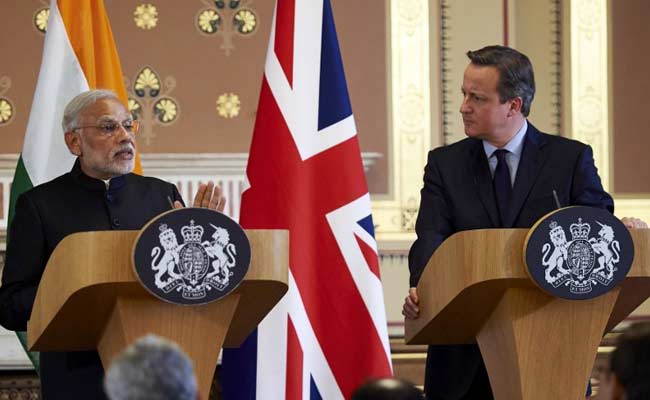PM Modi addressed a joint press conference with his British counterpart David Cameron after India and UK held bilateral talks in London. (AFP)
London:
India is committed to protecting every citizen's freedom, and the law will deal severely with those who are intolerant, said Prime Minister Narendra Modi at a joint press conference with his host and UK counterpart David Cameron in London today.
He had been asked by British media why "India is becoming an increasingly intolerant place".
'India is the land of Buddha and Gandhi, we will not accept any deviation from our values. Every such incident is serious. We won't tolerate such incidents,' said PM Modi adding, "The law will deal severely with such incidents. India is a vibrant democracy and we are committed to it."
Several other blunt questions were thrown at the two Prime Ministers, with one journalist referring to a visa ban on Mr Modi after the Gujarat riots of 2002, when he was chief minister of the state. Britain ended the boycott in 2012.
 "I am pleased to welcome PM Modi here, he comes with an enormous mandate from the people of India, who made him PM with a record and historic majority. As for what happened in the past, there were legal proceedings... We are discussing the future partnership between Britain and India," said Mr Cameron.
"I am pleased to welcome PM Modi here, he comes with an enormous mandate from the people of India, who made him PM with a record and historic majority. As for what happened in the past, there were legal proceedings... We are discussing the future partnership between Britain and India," said Mr Cameron.
And Prime Minister Modi said, "To set the record straight, I came here in 2003 and was welcomed. UK has never stopped me from coming here. That is a wrong perception."
He did not answer a question on protests being staged during his three-day visit by some groups that have accused PM Modi of creating an "authoritarian culture" in India.
Some 46 British MPs have signed a parliamentary motion urging Mr Cameron to raise what they call human rights issues with the Indian government.
PM Modi's visit to the UK comes amid a raging debate on "intolerance" back home after mob killings over rumours of beef-eating and attacks on rationalists.
Ahead of PM Modi's visit British media talked about "deepening troubles" mentioning not just the allegations of "intolerance" but also the embarrassing defeat suffered by PM Modi's party, the BJP, in the Bihar assembly elections on Sunday.
He had been asked by British media why "India is becoming an increasingly intolerant place".
'India is the land of Buddha and Gandhi, we will not accept any deviation from our values. Every such incident is serious. We won't tolerate such incidents,' said PM Modi adding, "The law will deal severely with such incidents. India is a vibrant democracy and we are committed to it."
Several other blunt questions were thrown at the two Prime Ministers, with one journalist referring to a visa ban on Mr Modi after the Gujarat riots of 2002, when he was chief minister of the state. Britain ended the boycott in 2012.

And Prime Minister Modi said, "To set the record straight, I came here in 2003 and was welcomed. UK has never stopped me from coming here. That is a wrong perception."
He did not answer a question on protests being staged during his three-day visit by some groups that have accused PM Modi of creating an "authoritarian culture" in India.
Some 46 British MPs have signed a parliamentary motion urging Mr Cameron to raise what they call human rights issues with the Indian government.
PM Modi's visit to the UK comes amid a raging debate on "intolerance" back home after mob killings over rumours of beef-eating and attacks on rationalists.
Ahead of PM Modi's visit British media talked about "deepening troubles" mentioning not just the allegations of "intolerance" but also the embarrassing defeat suffered by PM Modi's party, the BJP, in the Bihar assembly elections on Sunday.
Track Latest News Live on NDTV.com and get news updates from India and around the world

